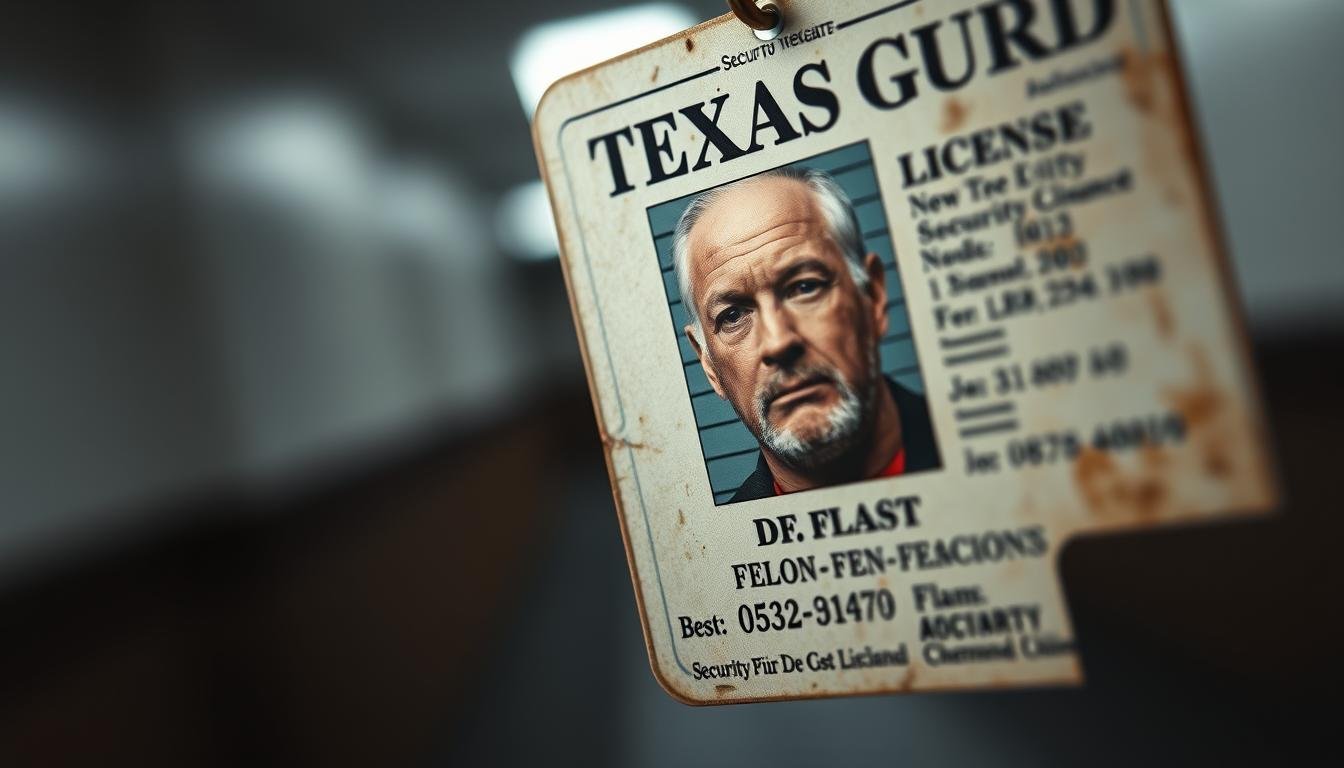Last updated on August 9th, 2025 at 01:28 pm
Can a Felon Be a Security Guard in Texas? If you’re a felon looking for a fresh start, you might wonder if you can work as a security guard in Texas. The state’s security guard licensing requirements can be tough, especially for those with a criminal record.
Texas security guard requirements are governed by specific regulations and laws. These rules dictate who can get a security guard license. Knowing these rules is key for anyone wanting to work in security.
To get a security guard license with a felony conviction, it’s important to understand the process. You need to know the criteria for security guard jobs for felons in Texas. This will help you navigate the challenges you might face.
Contents
- 1 Texas Security Guard Licensing Requirements
- 2 Can a Felon Be a Security Guard in Texas?
- 3 Potential Pathways for Felons in Security
- 4 Application Process for Security Guard License
- 5 Alternative Career Options in Security
- 6 Conclusion: Can a Felon Be a Security Guard in Texas?
- 7 FAQ
- 7.1 Can a person with a felony conviction apply for a security guard license in Texas?
- 7.2 What types of felony convictions are considered for a security guard license in Texas?
- 7.3 How long after a felony conviction can I apply for a security guard license in Texas?
- 7.4 Can I appeal a denial of my security guard license application due to a felony conviction?
- 7.5 Are there alternative roles in the security industry for individuals with felony convictions?
- 7.6 What are the requirements for obtaining a security guard license in Texas?
- 7.7 How do I prepare for the security guard license application process in Texas?
Texas Security Guard Licensing Requirements
If you’re thinking about becoming a security guard in Texas, knowing the licensing process is key. The Texas Department of Public Safety (DPS) manages security guard licenses. They make sure everyone meets the needed standards to do their job well.
The process includes background checks, training, and exams. Texas has different security guard licenses, each with its own rules.
Level II Commissioned Security Officer
A Level II Commissioned Security Officer can carry a gun on the job. To get this license, you need to finish a 15-hour training course. This course covers important topics like:
- Legal issues related to security
- Use of force
- Firearm safety and proficiency
After training, you must pass a DPS-written exam. You also need to pass a detailed background check, including fingerprints.
Level III Personal Protection Officer
A Level III Personal Protection Officer provides personal security, often for individuals needing close protection. Their training includes advanced personal protection, threat assessment, and defensive tactics.
To get a Level III license, you need 15 hours of classroom training and a written exam. You must also show you can handle firearms, if needed.
Here’s a quick overview of what you need for Level II and Level III licenses in Texas:
| License Level | Training Hours | Examination | Background Check |
|---|---|---|---|
| Level II | 15 hours | Written examination | Fingerprinting and thorough background check |
| Level III | 15 hours | Written examination | Fingerprinting and thorough background check |
Knowing these requirements is vital for anyone wanting to be a security guard in Texas. By meeting the state’s standards, you can have a successful and legal career in security.
Can a Felon Be a Security Guard in Texas?
In Texas, there are laws about who can be a security guard. If you have a felony, it’s important to know these rules. This will help you figure out if you can get a security guard license.
Violent crimes like assault or murder make it hard to be a security guard. Texas law says you can’t get a license if you’ve been convicted of violent felonies. This is because of the serious nature of these crimes.
Drug-Related Offenses
Drug crimes, like possession or distribution, can also be a problem. The Texas Department of Public Safety (DPS) looks at each case closely. They consider the type and how serious the crime was.
Theft and Fraud
Theft or fraud felonies can make it tough to get a security guard license. These crimes are seen as serious. The DPS might think you lack integrity, which is important for security jobs.
Sexual Offenses
Sexual offenses make you ineligible for a security guard license in Texas. The state’s rules are strict. They want to make sure security guards are trustworthy and safe for everyone.
In short, having a felony doesn’t mean you can’t be a security guard in Texas. But, the type of felony matters a lot. Knowing the laws about felons in the security industry can help you apply for a license.
Potential Pathways for Felons in Security
Even with a felony, you can still find jobs in the security field. There are many ways to get into this sector.
Consider jobs that don’t need a security guard license. For example, you could work in security consulting. Here, your experience helps businesses improve their security.
Another choice is private investigation. Texas laws might let you work in this field with the right training.
It’s crucial to know the laws and requirements for security jobs in Texas.
Some areas to look into are:
- Security system design and installation
- Loss prevention services
- Security training and education
Some companies might hire felons for security jobs, especially if you have the right skills. You could also work with a staffing agency that helps felons find jobs.
Learning about Texas security laws and job requirements can help you find the right job.
Application Process for Security Guard License
Getting a security guard license in Texas is a big step. It involves several steps, from filling out your application to passing background checks.
To begin, you must meet theTexas security guard requirements. This means you must be at least 18, have a high school diploma or GED, and be a U.S. citizen or lawful alien.
The first step is to submit your fingerprints for a background check. This is done through the Texas Department of Public Safety (DPS). It’s important because the DPS checks your criminal history.
Here’s how to apply step by step:
- Finish the required training hours at an approved school.
- Submit your application online through the Texas Private Security Board’s portal.
- Pay the fees, including application and licensing costs.
- Provide fingerprints for a background check.

If you have a felony, getting afelon security guard licenseis more challenging. The Texas Private Security Board looks at each case closely. They consider the type of felony and how long ago it happened.
After you’ve applied and passed the background check, your application is reviewed. If it’s approved, you’ll get a security guard license. This lets you work in the security field in Texas.
By following these steps and meeting the requirements, you can get yoursecurity guard licensein Texas.
Alternative Career Options in Security
For those with felony convictions, there are many ways to enter the security field. Some jobs, like being a security guard, might be tough to get. But, there are other paths you can take.
Look into jobs that don’t need a security guard license. These roles let you be part of the security world. You can help keep people and places safe.
- Security consultants
- Intelligence analysts
- Cybersecurity specialists
- Loss prevention specialists
- Private investigators
These jobs need different skills and might need special training or certifications. For example, in cybersecurity, you protect computers and networks from hackers.
Career Opportunities and Salary Ranges
| Career | Typical Salary Range | Required Education/Training |
|---|---|---|
| Security Consultant | $50,000 – $100,000 | Bachelor’s degree, relevant experience |
| Intelligence Analyst | $40,000 – $80,000 | Bachelor’s degree, analytical skills |
| Cybersecurity Specialist | $70,000 – $150,000 | Bachelor’s degree, certifications (e.g., CompTIA Security+) |
These salary ranges are just estimates. They can change based on where you work, how much experience you have, and the industry. But, they show the kinds of jobs and pay you could get in security.
By looking into these other careers, you might find a job that fits your skills and interests. Even if being a security guard isn’t an option.
Conclusion: Can a Felon Be a Security Guard in Texas?
You now know the details about felons working as security guards in Texas. The rules for getting a security guard license are strict. Having a felony can make it harder to qualify.
Even with a felony, it’s not impossible to get a license. The Texas Private Security Bureau looks at many things when deciding. Getting a pardon or showing you’ve changed can help.
If you can’t be a security guard, there are other jobs in the field you might do. Knowing how to apply and what you need for a license is key. This helps figure out if you can work in security.
Whether you can be a security guard in Texas with a felony depends on your situation. It also depends on the rules of the Texas Private Security Bureau.
See Also: What Rights Do Felons Lose in Arizona?
FAQ
Can a person with a felony conviction apply for a security guard license in Texas?
If you have a felony conviction, you might still get a security guard license in Texas. It depends on the type of crime and how long ago it happened. The Texas Department of Public Safety (DPS) looks at each case individually.
What types of felony convictions are considered for a security guard license in Texas?
Texas checks on violent crimes, drug crimes, theft, fraud, and sexual offenses. They see if your crime is related to the job of a security guard.
How long after a felony conviction can I apply for a security guard license in Texas?
There’s no set time limit after a felony to apply for a security guard license in Texas. But, the DPS looks at how long it’s been and other things when they review your application.
Can I appeal a denial of my security guard license application due to a felony conviction?
Yes, you can appeal if your application is denied. The Texas DPS has a way for you to appeal. You can provide more information or clear up any issues that led to the denial.
Are there alternative roles in the security industry for individuals with felony convictions?
Yes, people with felony convictions can find jobs in security. For example, you could work in security consulting or private investigation. These jobs don’t need a security guard license but still help keep people safe.
What are the requirements for obtaining a security guard license in Texas?
To get a security guard license in Texas, you need to meet certain requirements. You must complete training and pass a background check. The exact needs depend on the type of license you want, like a Level II Commissioned Security Officer or a Level III Personal Protection Officer.
How do I prepare for the security guard license application process in Texas?
To get ready for the application, check the requirements and gather your documents. Make sure you’ve done the needed training. Also, be ready for a background check as part of the process.

Van Maldonado, born in California, holds a degree in Criminology and Police Science. Currently serving as an investigative officer at a local police station, he spends his leisure time writing insightful content for FelonScope.com.

